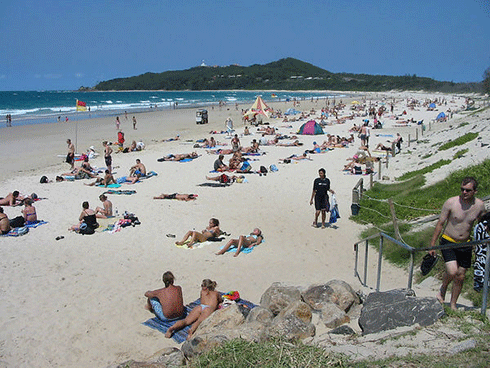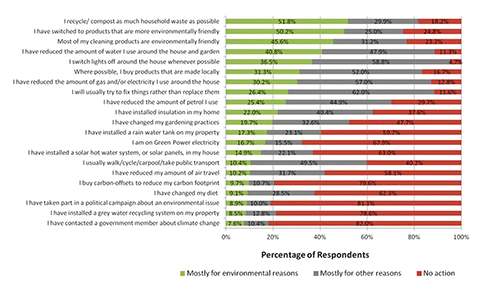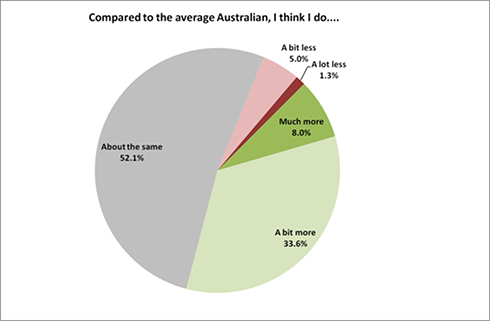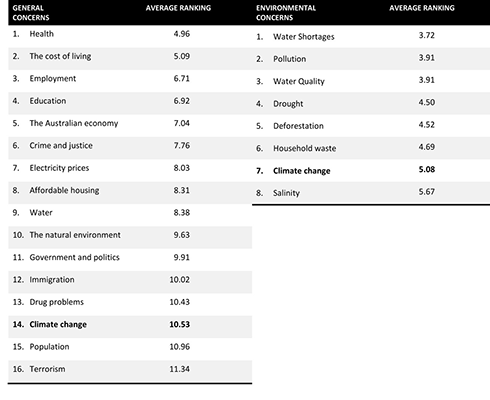
|
Published: 10 February 2014
Most of us overestimate how ‘green’ we really are
Most Australians overestimate how much they are doing for the environment compared to others, and are more concerned about water shortages, pollution and household waste than climate change, a new CSIRO survey reveals.

|
|
Australians are now less concerned about climate change than they were in 2010. Credit: Jy Pendergast/Shot at Byron/Wikimedia Commons
|
Taken over a period of July to August last year, it is the latest in a series of annual national surveys on Australians' attitudes to climate change involving more than 5000 people from across urban, regional, and rural Australia. (You can read about past survey results here and here.)
More than 70 per cent of people said they thought climate change was an important issue, which has remained consistently the case since we first asked this question in 2010.
However, compared to many other issues including health, costs of living and other environmental issues such as drought, we found that climate change was considered to be much less of a concern.
Biased towards ourselves
The way we perceive ourselves and others can influence how we respond to contested issues, including climate change. However, these perceptions are subject to cognitive biases or distortions as we attempt to make sense of the world around us.
Misperceptions about what others think about climate change extend to misperceptions about what others do.
One of the questions we asked people in this latest survey was what they were doing in their everyday lives to respond to climate change, and why.
For example, did they always recycle their household waste, had they installed solar panels, or had they changed their diet? The results are shown below.

|
|
What environmental actions people said they were doing in their everyday lives. Credit: CSIRO
|
When we added up all the actions people said yes to (regardless of why they were doing them), we found a normal distribution of responses: a few people did not much of anything; quite a lot of people did a moderate amount; and a few people did a great deal.
We then asked our respondents this question: ‘How much do you think you do compared to the average Australian: a lot less, a little less, about the same, a bit more, or a lot more?’ Here’s what they said.

|
|
How much environmental action the survey respondents thought they took, compared with an average Australian. Credit: CSIRO
|
So how good were our 5000 respondents at guessing how they compared with others? To find out, we cross-referenced what people said they did with their estimates of how they compared with an average Australian.
Just under one-quarter (21.5 per cent) got it about right: regardless of how many actions they performed, their assessment of where they stood in relation to other people was fairly accurate.
The same amount (21.5 per cent) were what we might call ‘self-deprecating’: they undervalued their comparative performance.
But more than half our participants (57.1 per cent) were ‘self-enhancing’: they tended to overestimate how much environmental action they took compared to others.
Research tells us that it’s not just the environment where we tend to think we’re better than others.
The ‘better than average effect’ describes our predisposition to think of ourselves as exceptional, especially among our peers. The effect reflects our tendency to think of ourselves as more virtuous and moral, more compassionate and understanding and (ironically) as less biased than other people.
In a famous example, when people were asked to assess their own driving ability relative to peers, more than three-quarters of people considered themselves to be safer than the average driver.
Dr Zoe Leviston discusses some of the findings of CSIRO’s fourth annual survey of Australian attitudes towards climate change.
Credit: CSIRO
How important is climate change?
When we asked people how important climate change was, just over 70 per cent of people rated it as ‘somewhat’, ‘very’, or ‘extremely’ important. That importance rating has remained unchanged when we first asked this back in 2010.
But this year we also asked people to rank the importance of climate change relative to a list of 16 general concerns in society, including health, the cost of living, and the economy. When framed in these relative terms, climate change was ranked as the third least important issue.

|
|
How people ranked a list of general and environmental concerns. Credit: CSIRO
|
Similar to previous years, we found the majority of respondents (81 per cent) think the Earth’s climate is changing, and people are more likely to think that human activity is the cause (47 per cent) as opposed to natural variations in temperature (39 per cent). When we look at repeat respondents (those people who participated in more than one of our surveys), we find no significant changes since 2010, although there was a very slight increase in the small proportion of people who say they ‘don’t know’.
Other changes have been slight, but noteworthy. There has been an increase in the levels of responsibility individuals feel to respond to climate change. People have also become more trusting about information from environmental and government scientists.
Dr Zoe Leviston is a social psychologist whose research investigates how individuals, groups and culture shape people’s responses to natural resource challenges, including water security, agricultural management and resource consumption. This article was originally published at The Conversation.



